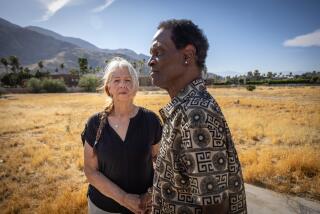The Other Side of the Country Club Scene
About eight blocks from where I grew up there was a big country club with high walls. Once upon a time rich people had lived near the country club, but now their homes had been closed up or torn down or split into apartments.
But the country club remained, elegant, aloof, forbidding, the entrance flanked by two huge towers and guarded by a wrought-iron gate.
I never set foot inside the country club and neither did any of my friends. The club did not allow Jews, blacks, Poles, Greeks, Italians, or most of the other people who made up my neighborhood.
As a child, I had been told that only WASPs were allowed in the country club and, naturally, I imagined large, winged insects riding around in golf carts.
At about this point in such narratives, the author usually states he never questioned the right of the country club to exclude him and his friends and that it was part of growing up.
The fact is, however, that I hated that country club from the first day I knew I couldn’t get into it. We all did. It’s not that we wanted to play golf. None of our families played golf--it was considered a rich man’s game--and the public parks and beaches right next to the country club were beautiful.
No, our anger stemmed from the fact that we and our families had been excluded, snubbed, made to feel like lesser people. And for no good reason. For no reason, that is, that we could ever change.
We could become rich and successful. We could take lessons and buy fancy golf clubs and leather bags and spiked shoes. But we could never, ever become un-black or un-Jewish or un-Italian.
And that is why we hated the country club. And that, it seems to me, is the point that some people missed when it came to the recent controversy at Shoal Creek.
Shoal Creek is a country club near Birmingham, Ala., that has never admitted blacks. It had no formal exclusion of blacks in its rules, but it didn’t need to. It was understood by everyone that blacks were not welcome.
Shoal Creek is also the site of this year’s PGA Championship, an event broadcast by ABC and sponsored by some of the biggest corporations in America.
Such tournaments have been held at all-white clubs in the past and are scheduled at all-white clubs in the future.
But the founder of Shoal Creek, Hall W. Thompson, made a terrible mistake some weeks ago when giving an interview to the Birmingham Post-Herald: He told the truth.
He said Shoal Creek would not be pressured into accepting blacks because “that’s just not done in Birmingham.”
And it wasn’t done. Not in Birmingham or hundreds of other cities around America. Blacks weren’t welcome here and Jews weren’t welcome there and women weren’t welcome over there.
But we are not supposed to talk about this. The unwritten rules say it is OK to discriminate in America as long as you don’t make a big deal out of it.
But, almost overnight, Hall Thompson had made Shoal Creek’s discrimination a big deal. While private discrimination hadn’t bothered anybody for years, this newly “discovered” public discrimination did. Civil rights organizations threatened to demonstrate. IBM, Toyota, Honda, Lincoln-Mercury, Anheuser-Busch, and Spaulding pulled their commercials from the broadcast.
And while no golfer withdrew from the tournament, Gary Player, a South African who once had a drink thrown in his face by an anti-apartheid activist, did condemn Thompson’s comments.
A compromise was frantically sought and one was frantically achieved: The PGA Tour said it would prohibit future tournaments at clubs where membership even “raises a question” of discrimination. And Shoal Creek agreed to admit a 66-year-old black businessman as an “honorary” member, even though he had not played golf in 20 years.
While honorary memberships to Shoal Creek are free, regular membership cost $35,000 in initiation fees. And a couple of black men in Birmingham announced they will seek membership. They have $35,000 and they wish to squander it in this manner.
Which is the whole point. I believe blacks should be allowed to wear fuzzy, cardigan sweaters. I believe Jews should be able to put on bright green pants. I think Latinos should be allowed the privilege of standing around a locker room with a bunch of naked, pot-bellied, knobbly-kneed windbags for 35 grand a year.
This is part of what America is all about: equal opportunity foolishness.
That country club near where I grew up went belly-up some years ago, by the way. That’s the thing about old money: It dies off.
The club was taken over by the city, which now uses it to train horses for its mounted police force.
So I could go back and drive through that gate and past those towers for the first time. And I might.
I might just take a look at all those horses trodding on those formerly exclusive greens and walking on those formerly restricted fairways. And I might wait until one of those horses produces what horses produce in prodigious quantities.
And then I might smile and reflect on the fact that while time does not heal all wounds, it does wound some heels.
More to Read
Go beyond the scoreboard
Get the latest on L.A.'s teams in the daily Sports Report newsletter.
You may occasionally receive promotional content from the Los Angeles Times.










